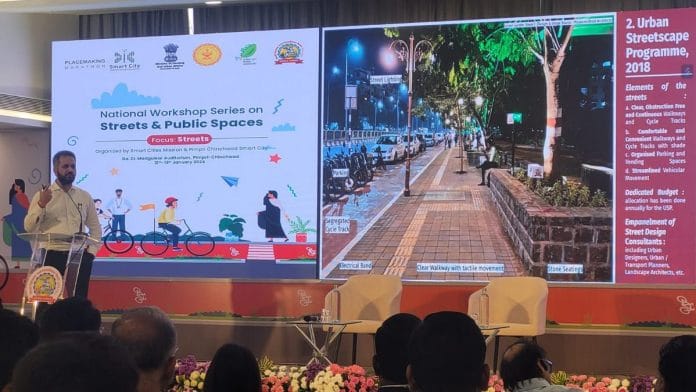Every year, more than 1.19 million lives are lost in road crashes across the world. In India alone, over 165,000 people die annually in such incidents—an enormous human and economic tragedy that costs the country an estimated 3 per cent of its GDP. As the world observed the 8th United Nations Global Road Safety Week from 12 to 18 May, under the theme ‘Streets for Life – Make Walking and Cycling Safe’, it is time for our cities to confront this crisis head-on, especially for the sake of their most vulnerable road users.
Pimpri Chinchwad, a key city in the Pune Metropolitan Region, is a microcosm of this broader national challenge. In 2022 and 2023, the Pune district recorded 3,343 road crash fatalities. Within the Pimpri Chinchwad Police Commissionerate, there was a small decline—fatalities fell from 373 in 2022 to 360 in 2023. Still, nearly one-third of those killed were pedestrians, and another 2 per cent were cyclists. For a city that aspires to be smart, inclusive, and liveable, these numbers are deeply concerning.
Our roads must serve people—not just vehicles. In Pimpri Chinchwad, 23 per cent of daily commuters walk, and around 1 per cent cycle. But the streets they navigate daily are fraught with danger. The absence of continuous footpaths, safe pedestrian crossings, and protected cycling lanes exposes them to constant risk. If our mobility systems are to be truly inclusive, they must be built around the needs of those who walk and cycle. Streets that are safe for the most vulnerable are streets that are safe for everyone.
Recognising this, the Pimpri Chinchwad Municipal Corporation (PCMC) has launched several people-first mobility initiatives.
Also Read: Reckless drivers, beware! This Pune engineer keeps score with his traffic violation hall of shame
Building India’s first 15-minute city
At the heart of PCMC’s efforts is Harit Setu—India’s first 15-Minute City pilot, located in Pradhikaran, Nigdi. Through this initiative, PCMC is redesigning key corridors to ensure that essential services, public spaces, and transit options are within safe walking or cycling distance. The project is being led by the newly formed Urban Mobility Department, reflecting PCMC’s commitment to sustainable and inclusive transport planning.
Harit Setu also aims to improve last-mile connectivity by integrating public transport modes—such as the Bus Rapid Transit System (BRTS) and metro—with safe, non-motorised transport infrastructure. Complementary measures such as lowering speed limits, redesigning high-risk locations, removing black spots, and introducing Safe School Zones in partnership with the Pimpri Chinchwad Police are making the city’s streets safer, step by step.
PCMC is also part of two global road safety programmes: the Bloomberg Philanthropies Initiative for Global Road Safety (BIGRS) and the Bloomberg Initiative for Cycling Infrastructure (BICI).
Pimpri Chinchwad is the only Asian city selected for BICI—a recognition of its leadership in promoting cycling. With support from partners like the Global Designing Cities Initiative (GDCI), the Institute for Transportation and Development Policy-India (ITDP), and Prasanna Desai Architects, the city is implementing world-class design principles to protect all road users. In a landmark move, PCMC has officially endorsed the Global Street Design Guide, further aligning its planning framework with international best practices.
Redesign the roads, not just rules
Despite progress, challenges remain—especially speeding, which continues to be a leading cause of road deaths. A rethink is needed in how we classify and design roads. Instead of relying solely on categories like arterial and sub-arterial, cities must adopt a context-sensitive approach that aligns street design with actual user behaviour.
Research shows that a small number of high-speed roads often account for the majority of pedestrian fatalities. These roads need to be redesigned with appropriate speed limits and built-in traffic-calming features, in line with Indian Road Congress standards.
Strong enforcement is equally vital. Installing speed cameras, expanding CCTV coverage, and ensuring coordination between PCMC, the Traffic Police, and the Regional Transport Office will help create a safer and more accountable road environment. Good street design can itself act as a form of self-enforcement—encouraging safer behaviour without the need for constant policing.
Of course, change is not always welcomed. Some stakeholders argue that narrower lanes and lower speed limits cause traffic delays or harm economic activity. But evidence from cities around the world shows the opposite—well-designed, safer streets make neighbourhoods more vibrant, healthier, and economically resilient.
Also Read: 460 road deaths every day—10 Indian states have come up with safety models. It’s working
Road safety is everyone’s job
To make a lasting impact, Pimpri Chinchwad must foster a city-wide culture of road safety. Civic authorities cannot do it alone. Citizens, schools, colleges, resident welfare groups, and companies all have a role to play in promoting walking and cycling. Drivers must learn to respect pedestrian crossings and cyclists’ right of way. Public awareness campaigns—on speed limits, helmets, seatbelts, and traffic discipline—must be expanded across media platforms. Change will only come when people are empowered to be part of the solution.
The city already has the data, pilot projects, and planning tools. Now, what’s needed is collective resolve—from policymakers, enforcers, and citizens alike—to put people before vehicles.
If Pimpri Chinchwad succeeds in cutting road crash fatalities by half by 2030, it will not only save hundreds of lives—it will also chart a new path for urban India. The journey to zero traffic deaths is long, but it begins with a single, safe step. Let this be the moment Pimpri-Chinchwad chooses Streets for Life—and in doing so, chooses a safer, healthier future for all.
Shekhar Singh, IAS, is the Municipal Commissioner and Administrator of the Pimpri Chinchwad Municipal Corporation. Jashwanth Tej Kasala is Program Manager, Global Designing Cities Initiative. Views are personal.
(Edited by Asavari Singh)







Pimpri was always full of pimps. It was always a “people first” business. Good to know that they continue to put people before vehicles.